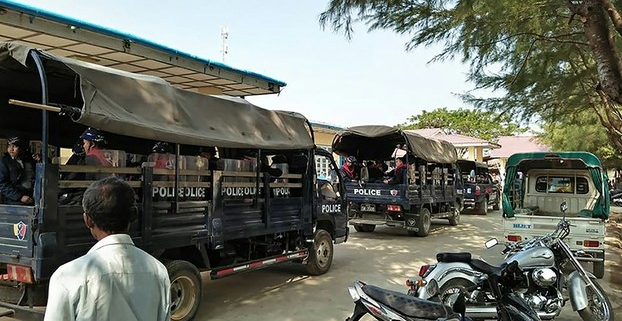Myanmar Authorities Arrest Rakhine Lawmaker, Plan to Charge Him With Treason
On Tuesday, police shot dead at least seven ethnic Rakhine protesters and wounded 13 others after thousands of members of the minority group marking a Buddhist anniversary converged on a local government building in the town of Mrauk U when authorities attempted to stop the event.
Later on Tuesday, police arrested Rakhine social critic Wai Hin Aung in the Rakhine capital Sittwe after he delivered a speech along with Rakhine nationalist lawmaker Aye Maung calling for revolt against Myanmar’s ethnic majority Bamar-led government in Rathedaung township and charged him under Article 17(1) of the Unlawful Association Act.
On Thursday, police arrested Aye Maung and also charged him under Article 17(1).
Aye Maung’s friend Aung Than Wai told RFA’s Myanmar Service that police took the lawmaker into custody at his home in Sittwe, where he had been waiting for them on Thursday after learning that a warrant had been issued for his arrest.
“Neither the township administrator, district administrator or the [ranking]police officer knew the reason of his arrest,” he said.
“We asked them why he was being arrested and the officials said it was because higher-ranking officials had ordered them to do so. Only when Aye Maung got to court was he informed by the judge that he was being charged under Article 17(1).”
Later on Thursday, Rakhine state government secretary Tin Maung Swe told reporters that Aye Maung and Wai Hin Aung, and organizers of the anniversary event—who did not receive permission to hold it—will face additional charges of “high treason” under Section 122 of Myanmar’s Penal Code and could be sentenced to death if found guilty.
“We received an order to charge the event leader San Hla Baw and other organizers in Mrauk U under Section 122,” he said.
“Writer Wai Hin Aung and Aye Maung, who gave talks in Rathedaung, will be charged under Section 122 as well. Their arrests were not related to the Mrauk U case—they were the result of their speeches.”
Tin Maung Swe also rejected media reports citing sources who said police had used excessive force in firing on the crowd that had tried to destroy property at the township’s government office.
“The media has said the police cracked down on the protesters, and that is wrong,” he said.
“It is because of the police’s action that they were able to stop the people who entered the government office and committed violent acts.”
In an interview on Thursday, Aye Maung told the Irrawaddy online news journal from custody that he had heard he would be charged for treason, and instead called for issues such as freedom of expression and the fundamental rights of citizens to be discussed in parliament, to address public concerns.
“I would not have been a lawmaker if I wanted to rebel against the government,” he told the Irrawaddy.
He also called Tuesday’s shooting “brutal” and predicted it will be “inked in history forever.”
“As they are heading toward national reconciliation, they [the Myanmar government]should be looking to share power with others,” he said, calling representation for ethnic groups “the key problem [that]is still unresolved today.”
Nyan Win, spokesman for Myanmar’s ruling National League for Democracy (NLD), said his party “wasn’t at all involved in Aye Maung’s arrest,” when asked about it Thursday.
Rakhine lawmakers
Ethnic Rakhine lawmakers condemned the shooting, noting that residents had peacefully celebrated the anniversary for six years without requiring permission from the local government.
Arakan National Party (ANP) Lower House MP Pe Than, of Myaybon township, said he was saddened to see such an incident occur under the NLD’s democratic government.
“This incident occurred because of the restrictions on holding a gathering, and the ethnic Rakhines will never forget it,” he said.
“Although the government said security forces tried to disperse people according to police procedures, certain issues remain, such as, why would they fire on unarmed people, and whether the protesters really did commit acts of violence.”
Lower House MP Ba Shein, an ethnic Rakhine representative for the ANP from Kyauk Phyu, said the incident had “damaged the trust between the people and the government.”
“We don’t want to suggest that the government did it intentionally, but it should have had a plan in place to avoid this kind of problem,” he said.
“We have heard the people’s comments on the government’s action. The authorities and ethnic leaders are working out the peace and national reconciliation process, but this kind of incident does not help.”
Mrauk U ANP lawmaker Oo Hla Saw said that the government, military, and ethnic leaders are “very far apart” on national reconciliation, despite two years under NLD rule, and that “progress has been reversed by this incident.”
Rights group reacts
Also on Thursday, New York-based Human Rights Watch issued a statement slamming authorities in Rakhine for their handling of Tuesday’s protest.
“The reported killings of Rakhine protestors by security forces in Rakhine’s Mrauk-U are the latest in a long history of assaults on protesters and freedom of expression in [Myanmar],” said Phil Robertson, Human Rights Watch’s deputy Asia director.
“The reported throwing of bricks by protesters in no way justifies this excessive use of force and the blatant disregard for the right to life,” he said.
Robertson urged Myanmar’s government to “immediately, independently and impartially investigate this incident” and hold those responsible to account.
“But given its track record, this is unlikely to happen, so the United Nations should be invited to investigate,” he added.
On Wednesday, London-based rights group Amnesty International, which said at least eight people had died in the incident, condemned the police shooting in Mrauk U as “yet another example of Myanmar security forces’ contempt for human life” and also urged authorities to launch an investigation.
Reported by Min Thein Aung, Waiyan Moe Myint, Khin Khin Ei, Thin Thiri, and Tin Aung Khine for RFA’s Myanmar Service. Translated by Khet Mar. Written in English by Joshua Lipes.



